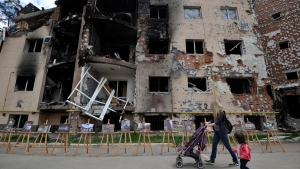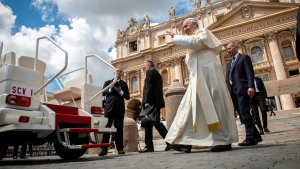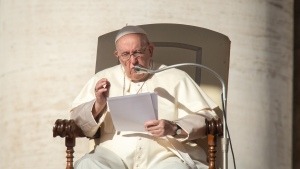Francis spoke directly to Vladimir Putin on October 2, begging him to end the fighting with Ukraine. A speech that contrasts with the previous interventions of the Holy Father since the beginning of the war in Ukraine. Interview with François Mabille, researcher at the CNRS and director of the observatory of geopolitics of religions of the Institute of International and Strategic Relations (IRIS).
Before the Sunday Angelus on October 2, Pope Francis emerged from the erasure for which he had been accused since the start of the war in Ukraine, positioning himself more firmly by addressing Vladimir Putin directly. For François Mabille, researcher at the CNRS and director of the observatory of geopolitics of religions of the Institute of International and Strategic Relations, “the latest position of Pope Francis (…) reflects the return of the Pope to the fundamentals of the Holy Headquarters in matters of mediation and peace”. Maintenance.
Aleteia: For the first time since the start of the war in Ukraine, Pope Francis spoke directly to Vladimir Putin this Sunday, “beseeching” him to end the “spiral of violence and death”. Do you think these words constitute a break?
Francois Mabille: There is a double change in the Pope: it is one of the first times that his approach to the conflict does not tend to put the aggressor and the attacked on the same level, that is to say that it does not seek to introduce a double responsibility among the belligerent parties. Let us remember that when his interview to Corriere Della Serra, François had thus evoked the “barking” of NATO at the gates of Russia, thus seeming to designate a co-responsibility in the conflict among the Ukrainians, the Europeans and their North American ally. Second change, and which is the most important: the pope analyzes the conflict with regard to international law, by condemning the referendum annexing the Ukrainian regions. It is of course from the beginning of the conflict that Francis should have articulated his approach to a legal reading, on the basis of the Charter of the United Nations, and in particular its chapter VII relating to threats against peace, and acts of aggression .
Pope Francis has spared no effort to position the Holy See and more broadly Catholics as agents of peace.
Is this “direct” appeal to the Russian president part of the policy adopted by the Vatican since the beginning of the conflict? If yes, how ?
I think what is in question is less the policy of the Holy See, that is to say the diplomatic work of the Secretariat of State and its nuncios than the personal attitude of Pope Francis. To understand his attitude since the beginning of the conflict, we must integrate three important parameters: by choosing the first name Francis in reference to Francis of Assisi, the Pope made peace an issue of his pontificate. And indeed, since his reception at the Vatican of the Palestinian and Israeli leaders, his action in Cuba, in Colombia, in various contexts in Burma, the Congo, the CAR and even the Ukrainian conflict, this pope has spared no effort to position the Holy See and more broadly Catholics as agents of peace. Second parameter: the Pope likes to take initiatives, to attempt overtures: his diplomacy is a diplomacy of movement, as we have seen with actors as different as the European Union and China. Third parameter: the Pope favors personal contacts, this can be seen both internally in his management of the Church and in his relations with politicians. These three parameters explain the Pope’s approach to the Ukrainian conflict, his visit, outside of any diplomatic use, to the Russian Embassy to the Holy See, his willingness to meet Vladimir Putin, his online meeting with Kirill and the recent appeal to the master of the Kremlin and the Ukrainian president. They also sign the limits: the Pope behaved like a pacifist militant, to the detriment of the traditional pontifical diplomatic approach, and his desire to be a mediator in favor of peace was not accompanied by an analysis lucid of this conflict, of the Putin regime and of the indexing of the Moscow patriarchate to Russian international policy.
Do you see an evolution in the way Pope Francis is positioning himself on the war in Ukraine?
Since 2015, and in an amplified way from March 2022, it has been quite difficult for the observer to understand how the situation in Ukraine was interpreted by the Vatican. The imprecision of the vocabulary, I am thinking in particular of his denunciation of nationalism, without specifying which one, the cookie-cutter formulas such as that of February 2015 where he evoked “a war between Christians”, reproduced in February 2022 in an indexation old-fashioned from the conflict to a war between “peoples proud to be Christians” but who see themselves “as enemies”, the refusal to name those responsible for the conflict, the oscillations between religious approaches, for example the consecration on March 25, 2022 of Ukraine and Russia to the Immaculate Heart of Mary, and politics (denunciation in May 2022 of the “barking of NATO” (sic) among the sources of the conflict), are all elements that gave the impression of a pontifical inability to analyze the situation.
Francis’ latest position reflects the Pope’s return to the fundamentals of the Holy See in matters of mediation and peace.
Let us add that the Holy See usually conforms to international law (which in this case makes it possible to designate Russia unambiguously as an aggressor state) and has seemed to forget any legal reading. The interview given by Pope Francis to Corriere della Serra in May 2022 was undoubtedly the culmination of this impotence in the analysis, which sees the Pope refusing to send arms to Ukraine, asking for help for this same Ukraine, offering mediation to Putin, while emphasizing that the latter did not deign to answer him: the impression that emerged from these remarks was more of being in front opinion of a pope than before analysis reflection of a religious leader at the head of one of the most important diplomatic networks in the world. The development dates from May 22 when Bishop Gallagher, breaking with the Pope’s remarks recalled above, explained that it was legitimate to help the Ukrainians, including militarily, thus returning to the usual approach of the Holy Headquarters and its doctrine, which is that of armed self-defence. Francis’ latest position goes in this direction and translates the Pope’s return to the fundamentals of the Holy See in matters of mediation and peace.
Can his words really have consequences?
There was a breach of trust between the Ukrainians and the Pope, which resulted in the summoning of the nuncio to Ukraine by the Ukrainian foreign minister. His remarks may allow him to rekindle or attenuate Ukrainian resentment. More generally and symbolically, given the specificity of the Holy See on the international scene, the denunciation of a rise to extremes and of a nuclear conflict falls within what is expected of a spiritual authority and can attract attention of those who are not sufficiently attentive to the importance of this conflict.
Can the Vatican be a player in resolving the war in Ukraine?
Military and warlike rhetoric currently predominates; the voice of France which, obstinately, since the beginning of the conflict, tried to influence Vladimir Putin, is less audible; in this context, any mediation proposal, however low its chances of success, is meritorious. And the Holy See, despite the errors observed, continues to have significant assets to unblock the situation.
Interview by Cécile Séveirac



